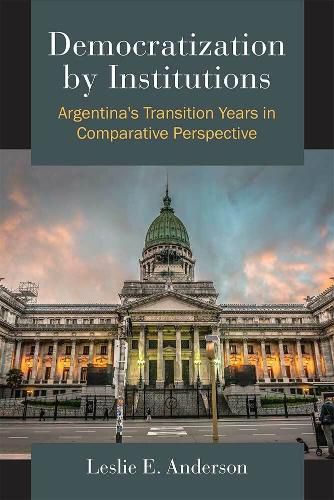Readings Newsletter
Become a Readings Member to make your shopping experience even easier.
Sign in or sign up for free!
You’re not far away from qualifying for FREE standard shipping within Australia
You’ve qualified for FREE standard shipping within Australia
The cart is loading…






In this pioneering study of democratization in Argentina, Leslie Andersonchallenges Robert Putnam’s thesis that democracy requires high levels ofsocial capital. She demonstrates in Democratization by Institutions thatformal institutions (e.g., the executive, the legislature, the courts) canserve not only as operational parts within democracy but as the drivingforce toward democracy.
As Anderson astutely observes, the American founders debated themerits of the institutions they were creating. Examining how, andhow well, Argentina’s American-style institutional structure functions,she considers the advantages and risks of the separation of powers,checks and balances, legislative policymaking, and strong presidentialpower. During the democratic transition, the Argentinian state has usedinstitutions to address immediate policy challenges in ways responsive tocitizens and thereby to provide a supportive environment in which socialcapital can develop.
By highlighting the role that institutions can play in leading a nationout of authoritarianism, even when social capital is low, Andersonbegins a new conversation about the possibilities of democratization.Democratization by Institutions has much to say not only to LatinAmericanists and scholars of democratization but also to those interestedin the U.S. constitutional structure and its application in other parts of theworld.
$9.00 standard shipping within Australia
FREE standard shipping within Australia for orders over $100.00
Express & International shipping calculated at checkout
In this pioneering study of democratization in Argentina, Leslie Andersonchallenges Robert Putnam’s thesis that democracy requires high levels ofsocial capital. She demonstrates in Democratization by Institutions thatformal institutions (e.g., the executive, the legislature, the courts) canserve not only as operational parts within democracy but as the drivingforce toward democracy.
As Anderson astutely observes, the American founders debated themerits of the institutions they were creating. Examining how, andhow well, Argentina’s American-style institutional structure functions,she considers the advantages and risks of the separation of powers,checks and balances, legislative policymaking, and strong presidentialpower. During the democratic transition, the Argentinian state has usedinstitutions to address immediate policy challenges in ways responsive tocitizens and thereby to provide a supportive environment in which socialcapital can develop.
By highlighting the role that institutions can play in leading a nationout of authoritarianism, even when social capital is low, Andersonbegins a new conversation about the possibilities of democratization.Democratization by Institutions has much to say not only to LatinAmericanists and scholars of democratization but also to those interestedin the U.S. constitutional structure and its application in other parts of theworld.